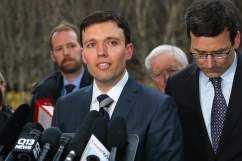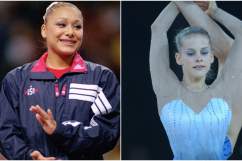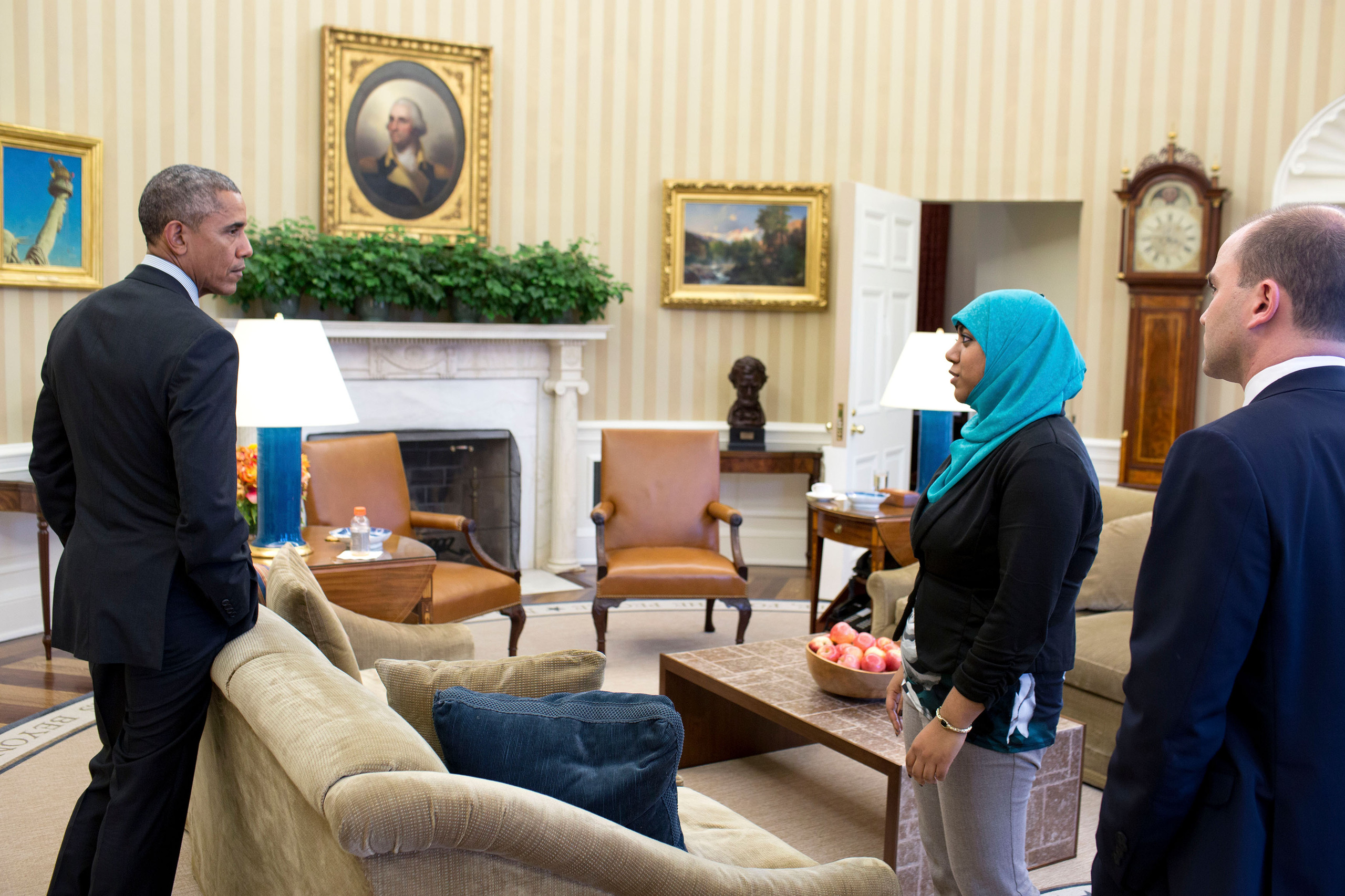
Rumana Ahmed in the Oval Office with President Barack Obama and National Security Advisor for Strategic Communications Ben Rhodes in 2015. (Pete Souza/White House)
Rumana Ahmed, a Muslim woman who worked as a deputy National Security Advisor under President Barack Obama and then stayed on after the election, left her position after eight days of the Trump administration.
Ahmed wrote in The Atlantic that she decided to leave after President Donald Trump signed his executive order banning immigration from seven majority-Muslim countries.
“Like most of my fellow American Muslims, I spent much of 2016 watching with consternation as Donald Trump vilified our community,” she wrote. “Despite this––or because of it––I thought I should try to stay on the NSC staff during the Trump Administration, in order to give the new president and his aides a more nuanced view of Islam, and of America’s Muslim citizens. I lasted eight days.”
Ahmed said the ban showed her she “could no longer stay and work for an administration that saw me and people like me not as fellow citizens, but as a threat.”
She worked on the National Security Council and was not a political appointee.
“My job there was to promote and protect the best of what my country stands for. I am a hijab-wearing Muslim woman––I was the only hijabi in the West Wing––and the Obama administration always made me feel welcome and included,” she said.
You can read her full op-ed here.
Here’s what you need to know about Ahmed:
1. Ahmed Says Her Time in the White House Working for Trump Was ‘Strange, Appalling & Disturbing’
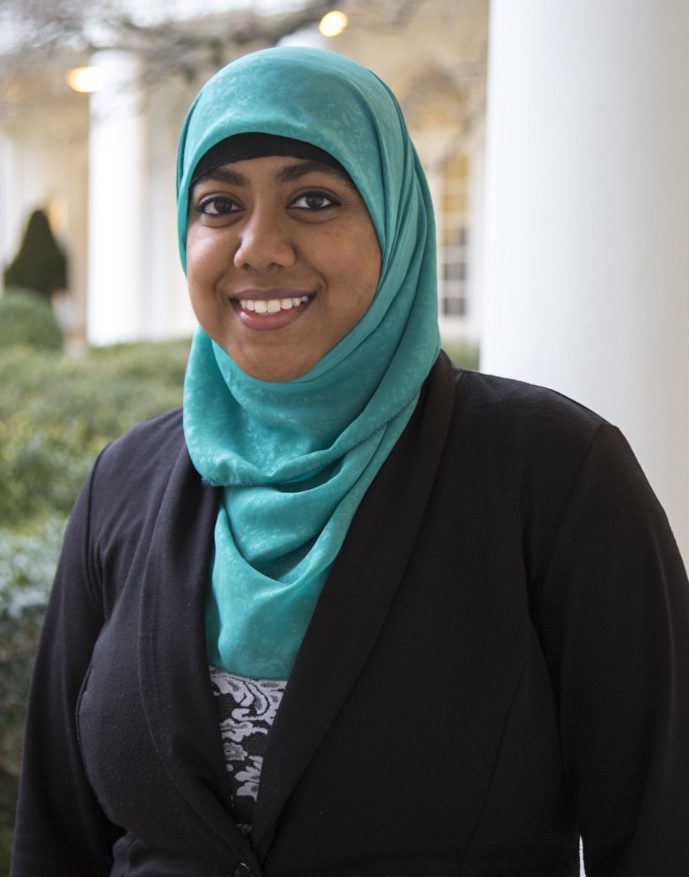
(Kelly Jo Smart/White House)
Rumana Ahmed wrote in The Atlantic that her eight days working in the White House under the Trump administration were “strange, appalling and disturbing.”
She was asked by Michael Anton, Trump’s senior National Security Council communications advisor, why she was leaving:
I told him I had to leave because it was an insult walking into this country’s most historic building every day under an administration that is working against and vilifying everything I stand for as an American and as a Muslim. I told him that the administration was attacking the basic tenets of democracy. I told him that I hoped that they and those in Congress were prepared to take responsibility for all the consequences that would attend their decisions.
He looked at me and said nothing.
It was only later that I learned he authored an essay under a pseudonym, extolling the virtues of authoritarianism and attacking diversity as a ‘weakness,’ and Islam as ‘incompatible with the modern West.’
My whole life and everything I have learned proves that facile statement wrong.
She said it was a difficult decision to stay in the White House after Trump won the presidency.
“Cautiously optimistic, and feeling a responsibility to try to help them continue our work and be heard, I decided that Trump’s NSC could benefit from a colored, female, hijab-wearing, American Muslim patriot,” she wrote.
Ahmed said when she walked into the White House on January 23, “Rather than the excitement I encountered when I first came to the White House under Obama, the new staff looked at me with a cold surprise. The diverse White House I had worked in became a monochromatic and male bastion.”
She said that the White House under Trump has become a “chaotic attempt at authoritarianism––legally questionable executive orders, accusations of the press being ‘fake,’ peddling countless lies as ‘alternative facts,’ and assertions by White House surrogates that the president’s national security authority would ‘not be questioned.'”
2. She Is the Daughter of Bangladeshi Immigrants & Says She Was Bullied for Being a Muslim After 9/11
Ahmed grew up in Maryland as the child of Bangladeshi immigrants who came to the United States in 1978, before she was born. She said she as bullied for being a Muslim after 9/11.
“I believe if you work hard and if you play by the rules, you can make it if you try in America, no matter who you are or how you pray,” she told MVSLM.com. “It’s how a young girl – once mocked and called names – can pursue her dream and proudly serve her country as a head-covering Bengali Muslim American woman in the White House.”
She said in her Atlantic op-ed that she started to wear a hijab when she was 12.
“It was encouraged in my family, but it was always my choice. It was a matter of faith, identity, and resilience for me,” she wrote. “After 9/11, everything would change. On top of my shock, horror, and heartbreak, I had to deal with the fear some kids suddenly felt towards me. I was glared at, cursed at, and spat at in public and in school. People called me a ‘terrorist’ and told me, ‘go back to your country.'”
Ahmed wrote about her experiences as a Muslim on the White House website last year:
I was born and raised in Maryland, not too far from D.C. Growing up, I played basketball, loved traveling and hanging with my family and friends, just like any other kid. But after the heinous attacks on 9/11, being a head-covering 8th grader would no longer be the same. There were days when my identity as a Muslim American became a struggle – I was glared at, cursed and spit at in public and in school. It was the tenets of my faith, the ideals of this country, the encouragement of those around me, and the determination to have my voice heard that carried me through and gave me the courage to pursue public service. I learned through hardship, that every challenge is in fact an opportunity to become stronger. Never would I have imagined as a young girl who was once mocked and called names that I’d end up working at the White House wearing a hijab in the West Wing.
She said, “This country has overcome and continues to strive to overcome every challenge, no matter how long it takes. The Civil Rights movement proves that. People had to struggle and suffer to work together and raise their voices to bring about change. Hearing the political discourse and hateful language certainly has negative consequences, but it is also the spark that has empowered me and others like me to speak up and work together in ways we may not have before.”
3. She Graduated From George Washington University in 2011 & Was Hired to Work at the White House That Same Year
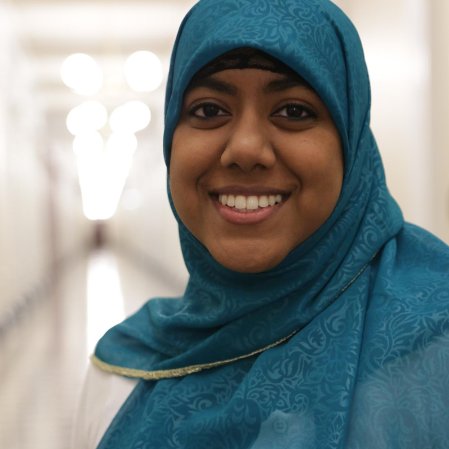
(Linkedin)
Ahmed graduated from George Washington University in 2011 with a degree in international relations and affairs, according to her Linkedin profile.
While in college she worked as an intern to Senator Barbara Mikulski and as an intern in the Department of Commerce. She also interned in the Office of Presidential Correspondence in 2009.
After her graduation she was hired by the White House as a senior analyst.
“My passion has always been in global social entrepreneurship and empowerment of women and their voices and I am proud to have been able to work on these issues here at the White House,” she wrote in a post on the White House website. “It was the President’s message of hope and change that inspired me to pursue an internship at the White House, and it was interning in Correspondence and reading letters that made me realize how important every voice was, including those of Muslim Americans.”
Ahmed was the only Muslim woman to wear a hijab in the White House.
“First of all, I couldn’t believe I was in this building. I was a little over-conscious of how people might be looking at me,” she told Al Arabiya about her experience when she started working in the White House. “People were so nice, they looked at me just like they looked at every single other person. Ben, my boss, has given me exciting opportunities to be in front of the president. Every time I’m there, I keep wondering if I’m standing out as being a hijabi.”
Ahmed told Al Arabiya she “actually felt empowered being a hijabi, because I think people came to me to ask for my perspective and valued my perspective, because they knew that I brought a different perspective.”
4. She Worked on Outreach to the Muslim Community Before Working for Ben Rhodes’ in the National Security Council
Ahmed was the Executive Assistant to the Deputy Assistant to the President & Director of Public Engagement in the White House from 2012 to 2014, according to her Linkedin profile.
She worked on outreach to the Muslim and Arab American communities, along with the Champions of Change Program.
“It was really exciting,” Ahmed told Al Arabiya. “Because I got to lift up voices and convene people, like in iftars and the president’s roundtable last year. One thing that, looking back, I never really realized was that even though you’re a young person, I think a question that people ask is, ‘do people take you seriously for being young, for being Muslim American?’”
In 2014 she moved to work for Ben Rhodes as the Advisor to the Deputy National Security Advisor for Strategic Communications. She remained in that position until her resignation from the White House last month.
Rhodes told Al Arabiya that Ahmed “is a great American success story, and a terrific representative of our country and its values. I rely on her every day, and she supports our work on everything from our support for global entrepreneurship to our engagement with the Muslim community; from the rebalance to Asia, to our normalization with Cuba.”
He said she “deeply values her country and her faith, and shows by way of example that those two things aren’t in conflict, but instead complimentary. Moreover, she’s always mindful of the example that she sets for others, particularly young Muslims who wonder about their place in America.”
5. She Says the Climate During Trump’s Campaign & After His Victory Reminds Her of the Islamophobia She Faced After 9/11
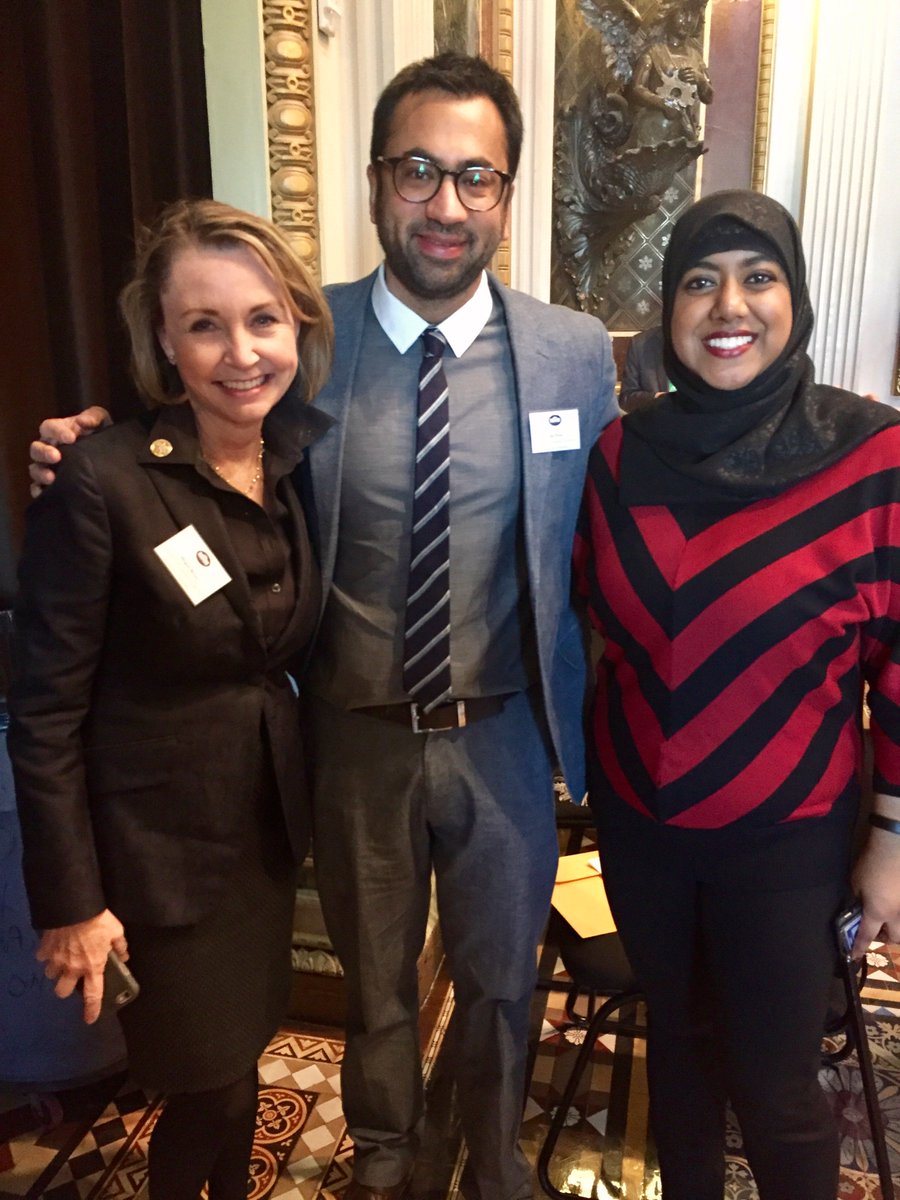
Rumana Ahmed with Kal Penn and Megan Beyer. (Twitter)
Rumana Ahmed wrote in her Atlantic piece that the atmosphere in the country while Trump was running for president has been toxic for Muslims:
The climate in 2016 felt like it did just after 9/11. What made it worse was that this fear and hatred were being fueled by Americans in positions of power. Fifth-grade students at a local Sunday school where I volunteered shared stories of being bullied by classmates and teachers, feeling like they didn’t belong here anymore, and asked if they might get kicked out of this country if Trump won. I was almost hit by a car by a white man laughing as he drove by in a Costco parking lot, and on another occasion was followed out of the metro by a man screaming profanities: ‘Fuck you! Fuck Islam! Trump will send you back!’
She said one of the first shocks came in April 2015 when three young Muslim students were fatally shot by an Islamophobe in Chapel Hill, North Carolina.
“Both the media and administration were slow to address the attack, as if the dead had to be vetted before they could be mourned,” she wrote. “It was emotionally devastating. But when a statement was finally released condemning the attack and mourning their loss, Rhodes took me aside to to tell me how grateful he was to have me there and wished there were more American Muslims working throughout government. America’s government and decision-making should reflect its people.”
She also said the conspiracy theorists who claimed the Obama administration had been infiltrated by Muslims were now working in the White House.
“Over the course of the campaign, even when I was able to storm through the bad days, I realized the rhetoric was taking a toll on American communities. When Trump first called for a Muslim ban, reports of hate crimes against Muslims spiked,” she said. “The trend of anti-Muslim hate crimes is ongoing, as mosques are set on fire and individuals attacked––six were killed at a mosque in Canada by a self-identified Trump supporter.”
Ahmed said she has been buoyed by the outpouring of people into the streets to defend their fellow Americans after the Muslim ban and other Trump policies were put into place.
“American history is not without stumbles, which have proven that the nation is only made more prosperous and resilient through struggle, compassion and inclusiveness. It’s why my parents came here,” she wrote. “It’s why I told my former 5th grade students, who wondered if they still belonged here, that this country would not be great without them.”

